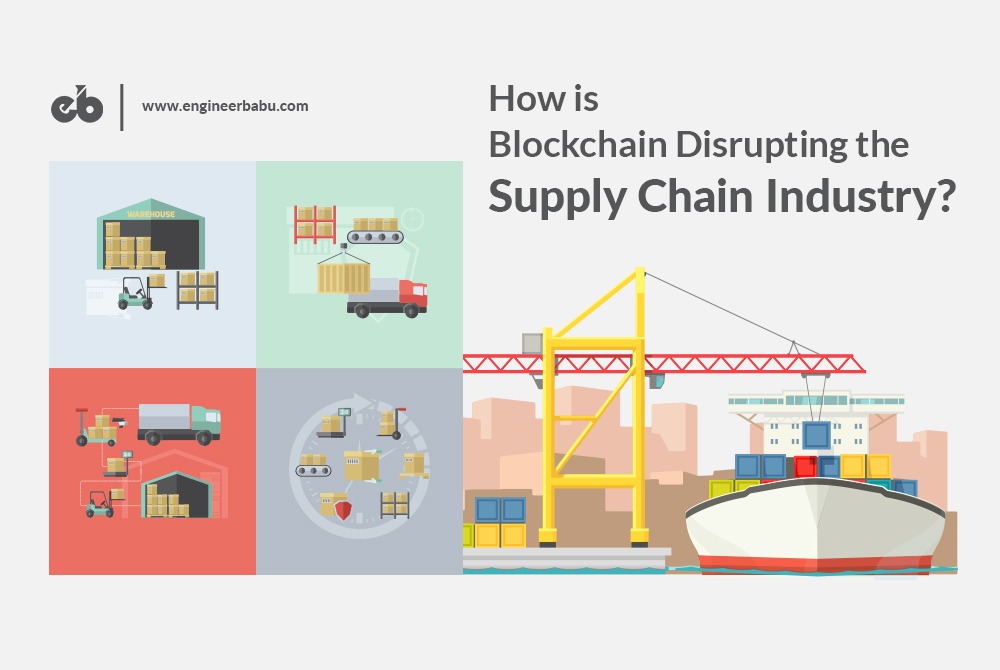How is Blockchain Disrupting the Supply Chain Industry
Have you ever wondered that where did the phone that you use in your day-to-day life come from? Or the clothes that you buy or the food that you eat? Besides the shops that you go to, there’s a whole other chain of different interlinked elements that work on delivering these products to you. This connected chain is called as Supply Chain.
Consider a clothing supply chain for instance. The clothing, textiles, and apparel manufacturing industries involve a lot of labors in them as the demand for work is never-ending. The estimated employ count in the industry is of than 60 million people globally. The term supply chain in the clothing sector refers to the back end of the industry. The supply chain in the clothing industry is made by connecting:
- Raw material sources
- Factories that use these raw materials and create final products
- Distribution network that delivers these clothes to consumers
On a global scale, the clothing supply chain consists of millions of people along with tonnes of water, crops, chemicals, and oil. This makes it difficult for manufacturers to find where the different parts of their products come from. The demand for increased speed, high volume, and cheaper consumption is increasing with each passing day. Due to this, when blind consumerism has valued the transparency of an ethical supply chain is compromised.
What is Supply Chain Management?
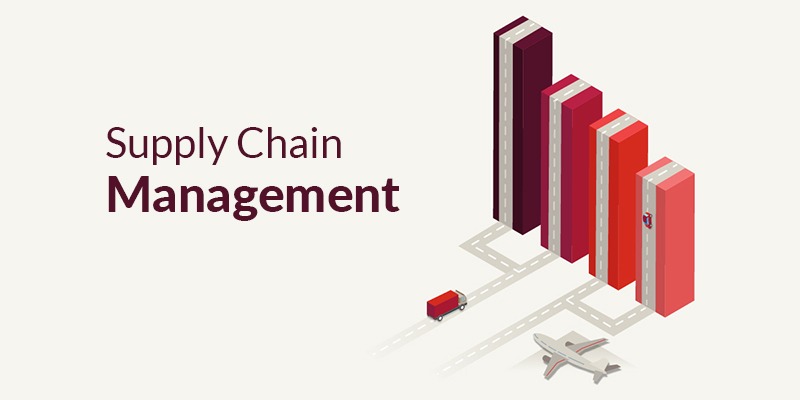
In more clear terms, Supply chain management includes the integrated planning as well as the execution of different processes. This involves material flow, information flow as well as financial capital flow. The management of the flow of goods, services, and information involving the storage and movement of raw materials, building products as well as full-fledged finished goods from one point to another is called as supply chain management. A supply chain within the SCM is a network of individual entities, organizations, businesses, resources as well as technologies that combine together in the manufacturing of a product or service.
Any supply chain progresses by initially delivering the raw materials from a supplier to a manufacturer and eventually ends by delivering the final product to the consumer. Proper implementation of supply chain management can result in benefits like increased sales and revenues, decreased frauds and overhead costs, quality improvisation. Moreover, this will also lead to accelerating production and distribution.
While all of this seems simple in theory, practically maintaining a supply chain is a tedious task even for small businesses. The interconnectivity of different elements in the supply chain gradually becomes more inefficient when a business grows. In order to resolve these inefficiencies and save a company’s money, different technologies like AI and Machine learning are being applied to SCM. Amongst these, blockchain is exploring new ways to change the overall game.
Supply Chain Challenges and Blockchain Solutions
Blockchain can be applied to many challenges of the Supply Chain industry such as complicated recordkeeping and tracking of products. As a less corruptible and better-automated alternative to centralized databases. Following are the ways in which blockchain can be useful in the supply chain industry.
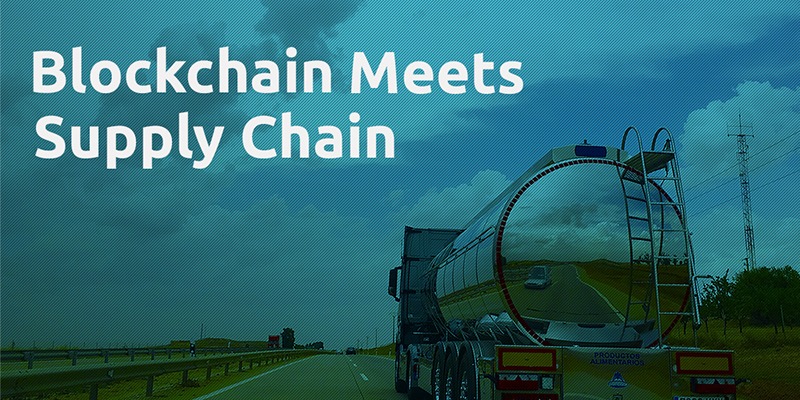
Provenance Tracking
Big companies and organizations have a lot of elements in their supply chains. Due to this, it becomes almost impossible to keep track of each and every record even for multinational corporations. The lack of transparency leads to cost and customer relations issues which ultimately dilutes the brand name.
In a blockchain-based supply chain management, record keeping and provenance tracking become easy as the product information can be accessed through the help of embedded sensors and RFID tags. The history of a product right from its origination to where it is in the present time can be traced through blockchain. Moreover, this type of accurate provenance tracking can be used to detect frauds in any part of the supply chain.
Cost Reduction
The real-time tracking of a product in a supply chain with the help of blockchain reduces the overall cost of moving items in a supply chain. According to a survey of supply chain workers conducted by APQC and the Digital Supply Chain Institute (DSCI), more than one-third of people cited reduction of costs as the topmost benefit of application of Blockchain in supply chain management.
When blockchain is applied to speed up administrative processes in supply chains, the extra costs occurring in the system are automatically reduced while still guaranteeing the security of transactions. The elimination of the middlemen and intermediaries in the supply chain saves the risks of frauds, product duplicacy and saves money too. Payments can be processed by customers and suppliers within the supply chain by using cryptocurrencies rather than customers and suppliers rather than relying on EDI. Moreover, efficiency will be improved and the risk of losing products will be reduced with accurate recordkeeping.
Establishing Trust
Having trust in complex supply chains with many participants is necessary for smooth operations. For example, when a manufacturer shares his products with suppliers, he/she should be able to depend on them for following factory safety standards. Also, when it comes to regulatory compliances such as custom enforcers, trust plays a vital role. The immutable nature of blockchain in the supply chain is well-designed to prevent tampering and establishing trust.
Benefits of Supply Chain with Blockchain
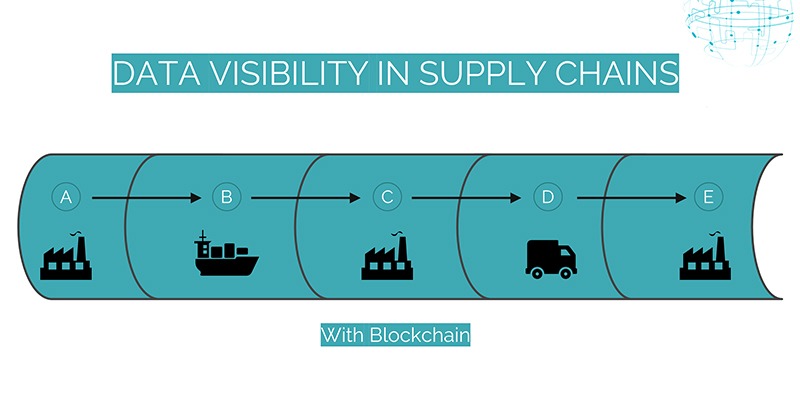
One of the most appealing benefits of using blockchain for data is that it allows the data to be more interoperable. Due to this, it becomes easier for companies to share information and data with manufacturers, suppliers, and vendors. Transparency in Blockchain helps reduce delays and disputes while preventing goods from getting stuck in the supply chain. As each product can be tracked in real-time, the chances of misplacements are rare.
Blockchain offers scalability through which any large database is accessible from multiple locations from around the world. It also provides higher standards of security and the ability to customize according to the data feed. Moreover, blockchains can be created in a private manner too which will allow the data to be accessed explicitly between the parties who have the permission for it.
The value of adopting blockchain technology can be taken from the fact that it has the potential to connect different ledgers and data points while maintaining the data integrity among multiple participants. The properties of transparency and immutability of blockchain technology make it useful for eliminating frauds in supply chain and maintaining the integrity of the system.
Other than these, few other benefits of adopting Blockchain technology in the supply chain industry are:
- Reduce or eliminate fraud and errors
- Improve inventory management
- Minimize courier costs
- Reduce delays from paperwork
- Identify issues faster
- Increase consumer and partner trust
Supply Chain Management with Blockchain Use Cases
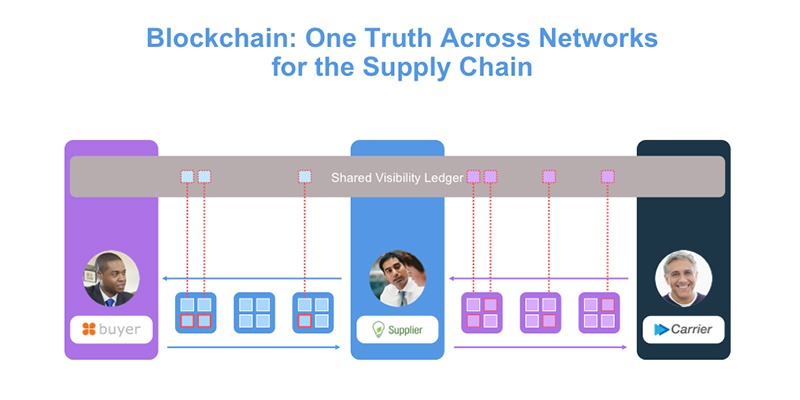
With its increasing popularity, blockchain technology seems like the solution to the problems of many industries today. Supply chain being one of the most populated industry holds certain use cases where the application of blockchain technology can make a difference. A single shipment of goods can have at least 20-25 people or organizations in the process which leads to roughly 200 interactions between them thus, leading to a lengthy process.
If applied correctly, blockchain technology can assure provenance tracking and traceability across the supply chain. This, in turn, will lead to fewer counterfeiters and ensured safety in the processes. Blockchain in the supply chain will also allow manufacturers, transporters, and end-users to collect data, study trends, and apply predictive monitoring process for better product experience. Following are some of the use cases of blockchain in a supply chain.
Seafood Verification
Seafood supply chain has caught the negative headlines many a time and still continues to do so due to the lack of a transparent system. The current seafood supply chain has tedious processes like manual recordkeeping that make it more prone to errors. Moreover, other issues that result in making the seafood supply chain inefficient are the improper food storage conditions, mislabeling frauds and prevalence of unregulated practices.
Due to these issues the quality and security of the food that reaches to the end-customer is compromised which threatens the industry’s economic security. Moreover, since there are the different type of frauds involved in the chain, the trust between the customers and vendors remain lacking.
Blockchain technology can prove to be a panacea to the seafood verification problems as it can track fish and seafood right from the production to its distribution. Big names such as Hyperledger have even started implementing the technology in their projects in order to resolve the issues of the seafood supply chain industry.
The project named Hyperledger Sawtooth is revolutionizing the supply chain by bringing traceability and accountability through its modular blockchain platform. It uses the PoET (the proof of elapsed time) consensus algorithm which allows actors in the system to reach a consensus in an environment where the counterparties are unaware of each other’s information.
Sawtooth allows the seafood to be detected in the supply chain through sensors that transmit the location and time of the products to the blockchain. This allows the buyer to access a comprehensive record of the product provenance.
Coffee Supply Chain
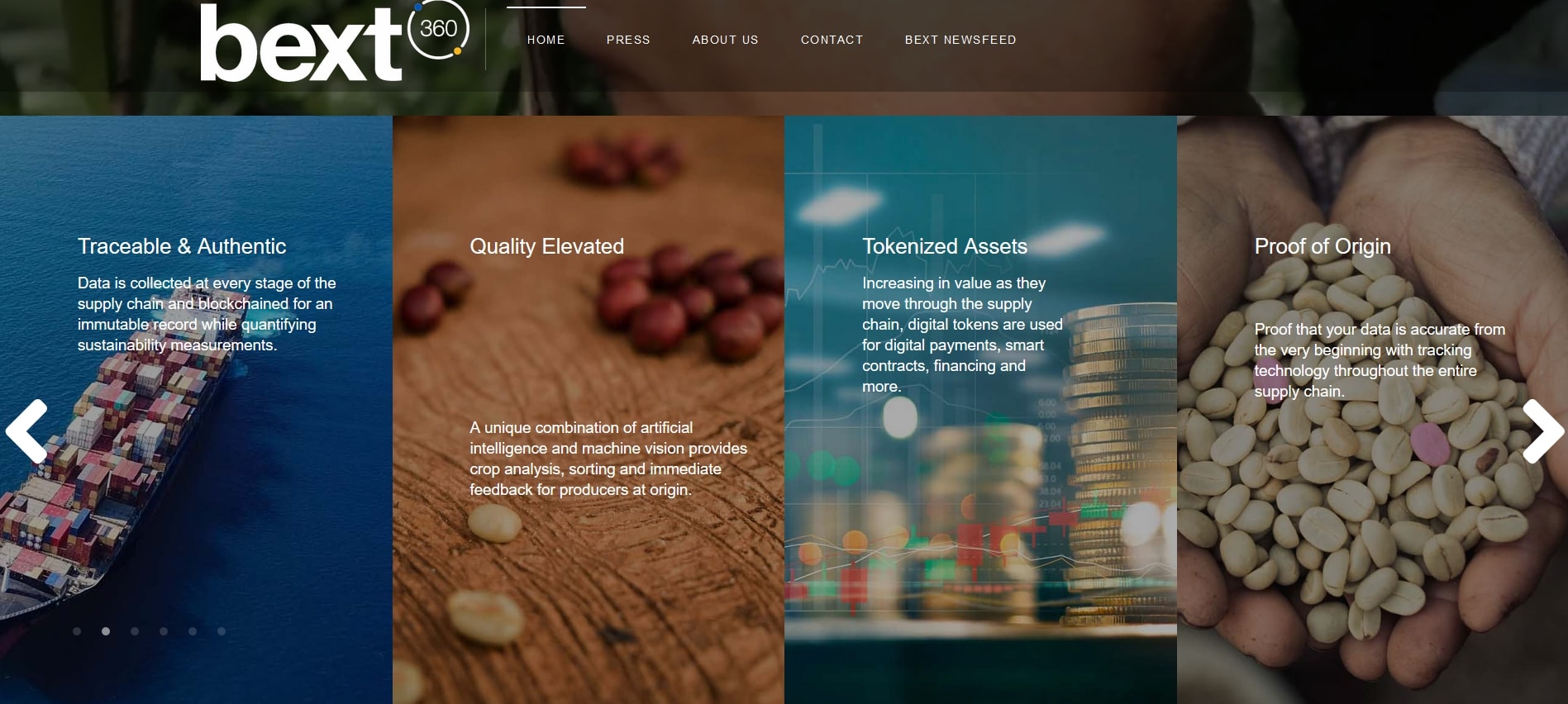
When you take a sip of that hot coffee in the morning from that big cup, you don’t even realize how long and complicated its supply chain must have been. The coffee supply chain in a global network that is highly complicated and is in a desperate need for reform. Production of coffee is fragmented as it is usually grown in developing areas of the world that are at remote locations. Other factors that affect the production of coffee and should be taken into consideration are volatile prices and the effect of changing climates.
Moreover, since the people working as farmers and laborers in the coffee supply chains are from remote developing areas, there have been reported cases of abuses too. Due to the complexity of the system, the coffee supply chain makes an ideal use case for blockchain adoption and bring transparency and efficiency to the system.
A Denver based startup, Bext360 is using a blockchain enabled machine called “bextmachine” that is used to analyze the coffee beans from the farms and assign a number to them for their traceability. When looked for performance, the machine is able to process around 50 kgs of coffee in one minute. The machine is also capable of scanning the outer fruit of each bean in a three-dimensional manner. Moreover, the machine also provides quality details about the coffee at the farm level itself, thus making more room for improvisation.
Using blockchain in the coffee supply chain brings more productivity along with fair deals for producers and transparency as the system ensures direct payments to the farmers once their products are sold. On the other hand, the end customer can always look at the data and track the original source of their coffee.
Drugs and Pharmaceuticals
Drug supply chain is one facet of the pharma landscape that can be profited by blockchain. Counterfeit medicines are becoming increasingly troublesome as the global black market has been providing such drugs to people without getting under the radar. The risk of human life that rises from taking counterfeit drugs cannot be underestimated.
The WHO has reported an increased sales of global fake drugs from $75bn in 2010, a 90% increase over the next five years. The major suffering population due to drug counterfeiting is from developing countries like Asia and Africa where such drugs constitute to around 10 to 30 percent of the total medicines for sale. It is becoming increasingly important for pharmaceutical companies and distributors around the world to improve the security and traceability of the drug supply chain.
Taking the complexity of the current drug supply chain due to the growing number of people, there have to be reliable digital technologies and management systems that can secure the overall process. Blockchain technology can resolve this problem as it has become significantly popular in terms of applications relating to supply chain management.
System vulnerabilities in the drug supply chain lead to many pain points such as very little visibility for tracking and authenticating the products. The introduction of blockchain in such cases can reap several benefits here. Drugs can be tagged with barcodes and once they are scanned, their records can be kept on a blockchain in secure digital blocks. These records will be updated in real-time as the drugs are transferred from one entity to the other in the supply chain. Parties with authorized access, including patients, can check the records anytime.
The immutable nature of blockchain provides drug traceability from manufacturer to customer and allows people to check if the system is compromised somewhere. Apart from ensuring product integrity and anti-counterfeiting efforts, blockchain technology can help overcome the financial issues faced by smaller retailers and operators along the supply chain.
Food Supply Chain
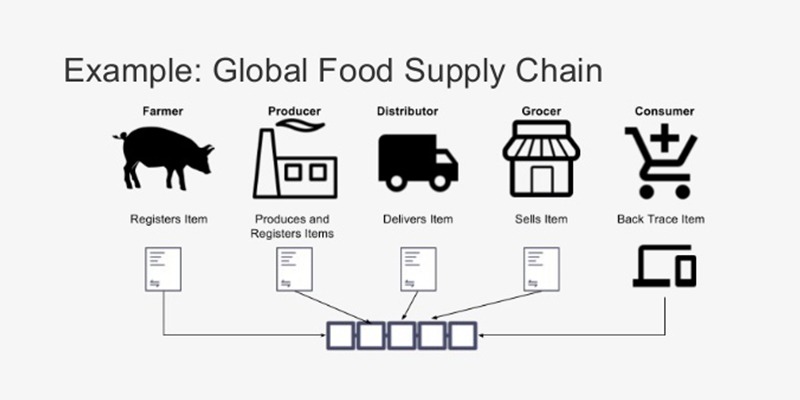
The complexity of our food supply chain is increasing gradually and due to this, it is becoming difficult for the food producers, suppliers and retailers to ensure the provenance of the products through the supply chain.
Food safety issues including cross-contamination Identifying and the spread of foodborne illness are made even worse by lack of data and traceability. the source of contamination and finding the root cause of that can take from days to months which ultimately leads to an increased number of sick people, loss of revenues, and wasted food. According to the WHO, one-out-of-ten people fall ill and around 420,000 die due to contaminated food.
Consumers are increasingly becoming aware and are demanding transparency in terms of the food they consume. Presently, about only 12 percent of consumers trust the brands that they purchase food from for the information of their food while 94 percent of consumers state that it is highly important for them to learn about all the information related to the food products that they buy.
Blockchain resolves the issues of a complex supply chain by providing neutrality in the platform. Since there are no third parties involved in the transaction authorization and everything works on the basis of a consensus, both, the users and the operators of the system have to follow set of rules to keep the system running.
Blockchain brings huge advantages for all the actors in food the supply chain. Food producers can ensure the originality and quality of their supplies by tracking the attempts of tampering as the food item moves in the supply chain. In case of identification of a fraud, the supplier will be intimidated and this notification can be sent to the retailer even before the food item reaches to its destination.
Similarly, in the case of retailers, if a damaged food product somehow makes it the stores, he/she can identify and remove only such offending items rather than checking the whole batch of supplies. With blockchain, consumers are treated with transparency and openness when they need assurance for the food products that they consume. This allows the consumers to identify and consume high quality food.
Automotive Supply Chain
Ranging from parts suppliers, manufacturers to sellers, the automotive supply chain is a highly complex and broad sector with multiple participants. Delivering real customer value requires analysis of existing IT and business processes along with solutions that abide by the permissions of security, confidentiality, and authorization. Blockchain can turn out to be an ideal solutiMoreover, Ireland’s Moyee Coffee, on in such cases as it provides transparency across the entire supply chain along with reduced costs and complexity of dealing with multiple parties. For automotive suppliers, blockchain can be used to protect their brands from duplicate products and to create customer-centric business models.
In the automotive industry, counterfeit products raise a significant issue for the automotive manufacturers. Also, the current market of counterfeit spare parts is estimated at several billion dollars. Such products can make their way to the supply chain either directly or through the OEM and aftermarket suppliers. Counterfeit spare parts are not reliable as they have degraded quality level and they often tend to fail which brings dissatisfaction to the end customers ultimately leading them to revoke their trust in the brand. Introducing blockchain technology for counterfeiting products proves to be significantly advantageous as it allows spare parts to be identified uniquely and represent them digitally. Digital identification of spare parts adds transparency to the system and it can be shared among multiple parties in the network.
Inbound Logistics and Smart Manufacturing with blockchain can allow the automotive supply chain to be efficient. Currently, the tracking of individual components of an inbound supply chain is complex and prone to errors. The coordination among multi-tier suppliers, 3rd party logistics, and transportation companies through the manufacturing plant is necessary for effective functioning of the supply chain. By using blockchain, we can ensure the availability of accurate and real-time information amongst different parties. People involved can an check the status, quantity as well as the location of individual parts.
Similarly, the outbound supply chain is also a complex network which consists of distributors, manufacturers importers, and dealers. These participants don’t have a common data sharing model as well which makes it difficult for them to exchange information. A shared blockchain based system ensures visibility and transparency which, in turn, ensures faster transactions and lowering settlement periods.
Conclusion

Blockchain has introduced its potential to bring out positive changes in many industries and businesses till date including the supply chain industry. In fact, the supply chain management is one of the most obvious and useful applications of Blockchain technology, therefore, we can expect it to grow at a very fast pace in the near future. The source of successful operation of a supply chain management system is to keep a robust, transparent and end-to-end communication.
Companies are exploring ways to filter the way their supply chains currently work and adopt the change that the Blockchain technology has to offer. Once businesses see the bigger picture, they’ll eventually go through the hassle of applying newer systems embedded with blockchain in order to reap bigger benefits in the future. Dumping the paperwork and centralized databases will bring effective change in terms of higher rewards and increased performance among the supply chain teams.
This can be achieved if and only if the supply chain teams in place take notice of the latest technology trends in the blockchain space and find feasible ways to adopt the technology in their existing systems. The use of blockchain in supply chain management will work as a game changer by eliminating the vulnerabilities and inefficiencies of the current system.

